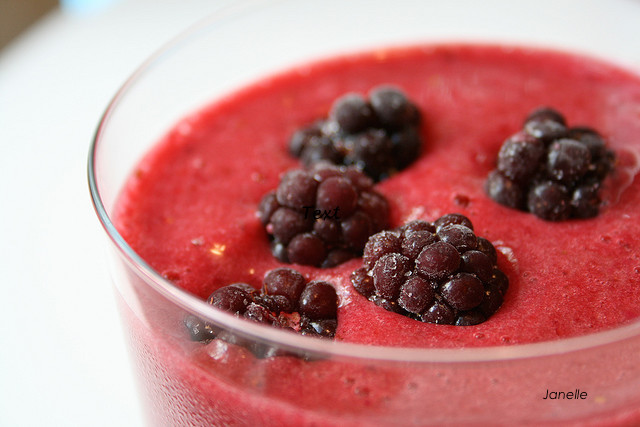Can A Smoothie Help Reduce Inflammation?

Chronic inflammation in the body leads to advanced aging and disease. It can be caused by many different factors including diet, allergy, stress, or injury. Determining cause allows us to take steps to manage or eliminate the problem and the foods we eat are key in treating any physical condition, including inflammation.
There are some foods that we know cause inflammation in the body: sugars, trans fat, dairy, alcohol, and chemicals in food, among others. We can avoid them if we know what they are.
If you are concerned about inflammation, whether you are feeling its effects or just want to support your immune system, here is a delicious smoothie to do that.
Let’s Review The Ingredients
Berries contain antioxidant phytonutrients called flavonoids (specifically, anthocyanin) in their skins that exhibit anti-inflammatory properties. They are the pigment that give berries their color.
Dark leafy greens are full of nutrients: vitamins, minerals, and antioxidants that support every system in your body. Magnesium in particular is important for inflammation regulation and kale, spinach, beet greens, okra, and broccoli are especially rich in this mineral.
Ginger is a magical plant. It aids digestion, prevents cancer, eases arthritis pain, and inhibits the formation of arterial plaque through its anti-inflammatory phytochemical gingerol.[1]
Coconut oil is a healthy, nutrient-rich saturated fat that has a positive influence on your body, specifically:
“The anti-inflammatory, analgesic, and antipyretic effects of VCO [virgin coconut oil] were assessed. In acute inflammatory models, VCO showed moderate anti-inflammatory effects on ethyl phenylpropiolate-induced ear edema in rats, and carrageenin-[sic] and arachidonic acid-induced paw edema. VCO exhibited an inhibitory effect on chronic inflammation by reducing the transudative weight, granuloma formation, and serum alkaline phosphatase activity. VCO also showed a moderate analgesic effect on the acetic acid-induced writhing response as well as an antipyretic effect in yeast-induced hyperthermia.”[2]
Chia seeds are high in omega-3 fatty acids (with eight times more than salmon!) which are critical for cell health. These building blocks reduce inflammation, thereby decreasing the risk for cardiovascular and neurodegenerative disease.[3] Flax seeds and walnuts are good substitutions.
Green tea contains antioxidants that reduce inflammation and may inhibit tumor growth. Black tea also reduces inflammation in the body but green tea somewhat more so, probably due to its higher flavonoid content.[4] Green tea has less caffeine than black tea; the level can range from 10-22mg per eight-ounce cup. This is in contrast to black tea which contains 22-28mg of caffeine. (The longer it steeps, the more caffeine is released.)
The Anti-inflammatory Smoothie
Ingredients:
• 1 cup berries of your choice (blueberries, raspberries, cranberries, blackberries, strawberries)
• 1 cup leafy greens of your choice (kale, spinach, beet greens), compressed
• 2-inch (5 cm) piece of ginger
• 1 tablespoon unrefined organic coconut oil
• 1 teaspoon (or more, to taste) of fresh chia seeds
• Green tea, steeped to desired strength
• Honey, maple syrup, or stevia to taste to sweeten, if desired
Directions:
Put all ingredients in a blender and mix well. Drink immediately to enjoy the most nutritional benefits.
For a cold-weather drink that warms, soothes, and has a huge anti-inflammatory impact, try golden milk.
Source
[1] [2] [3] [4]
Pablo Tymoszuk is a soft tissue therapist specialising in remedial, myofascial and dry needling techniques. He also acts as an ergonomic specialist and wellness consultant which has motivated him to co-author the eBook Stop Headaches Naturally.
Together with Dr Margaret Scarlett they present a range of strategies for stopping headaches and migraines without drugs. All strategies are organized in a systematic manner and backed up by references to the scientific literature.





